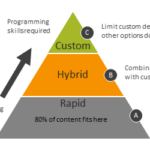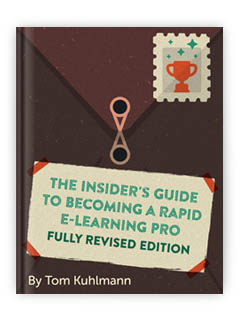
Just finished back-to-back conferences in San Jose and San Diego. As always, it’s fun getting to meet the blog readers and Articulate customers. Many of them are working with limited resources and it’s interesting to see how they approach their work. I also get lots of good questions.
One of the most frequent questions asked is whether or not they need instructional design degrees. I get this question quite a bit and it seems I’m getting it more frequently.
If I hire someone, I put less emphasis on the formal education they have and focus more on their tangible skills. I’m interested in seeing a portfolio of work that represents their technical skills as well as their instructional design skills. I don’t care if they acquired the skills in a formal or informal setting. I’m just concerned with them having the skills.
However, I do appreciate what it takes to get a degree in instructional design and know that what’s learned is valuable and can only enhance a person’s base of knowledge. Because of this, I usually tell people “No, they don’t,” and “Yes, they do.”
You DON’T Need an Instructional Design Degree
You don’t need a formal degree to learn the skills required to build good elearning courses. There are many books and resources available that will provide the same information you’d get in any formal program. Combine that with the easy authoring tools and rich informal learning networks available today and you’re all set. Besides many people with degrees tell me they didn’t learn how to apply what they learned in their programs.
If you do want to forego a formal education, here are a few tips to help you get started:
- Read books and apply what you learn to your projects. If you can’t apply them to real projects, create little mini modules where you practice different techniques. Add them to your portfolio with an explanation of what you did and why.
- Connect with others so you’re always exposed to new ideas and challenged in your thinking. One of the great things about social media is the access you have to all sorts of expertise. Be prepared to connect in a genuine way. People will tune you out if all you do is take.
- Develop a portfolio that demonstrates your understanding of instructional design. I also recommend combining your portfolio with a blog. The portfolio could be the formal environment to display your work. Whereas the blog is like the sandbox where you can flesh out ideas.
The key to success if you go this route is to continually practice your craft. It’s not easy staying on top of your learning. I recommend looking over the descriptions of some instructional design programs and then mapping out a plan of your own. Expose yourself to the same books and topics and just do them at your own pace.
You DO Need an Instructional Design Degree
The reality is that many employers require an advance instructional design degree. If all things are equal, the person with the degree will probably always be considered first.
Whether you like it or not, you’re competing in the marketplace with other qualified instructional designers. So you want to make sure that your skills and qualifications are equitable. That means if you don’t have a degree you might never be considered for different jobs.

Keep in mind, that many applications aren’t screened by the hiring managers. There’s usually some HR assistant who quickly skims resumes and the one who doesn’t meet the minimum requirements goes to the bottom of the pile.
That’s the pragmatic reason for getting a degree. Here are some other reasons:
- Broaden your horizon. You’ll be exposed to resources you may never ever consider or bother reading. It’s easy to say that you can read the book on your own, but HAVING to read and think through a book is completely different. The degree programs will force you to think, write, and apply what you’re learning.
- Challenge your thinking. You’ll connect with others who probably don’t think like you (and they may even be people you don’t like). You may not agree with others but wrestling with their ideas and debating different instructional concepts will help solidify what you know and give you a broader perspective on things. Besides, you may meet some lifelong friends through the program. Either way, it’s important to test what you think you know.
- Do new things. You can be an elearning developer with ten year’s experience who basically does the same type of course over and over again. Or you can be an elearning developer with three years, who’s worked on 10 diverse projects. Which one has the deeper understanding? In a formal program you’ll get to work on diverse projects and you never know where they’ll take you. One of the reasons for my employment with Articulate is because I was working on a communities of practice research project. That forced me to be more intentional about my involvement with the Articulate community, and eventually led to my job.
Getting Started.
If you are asking this question about instructional design degrees here’s what I‘d do:

- Look at current job listings. Go to industry job boards or sites like monster.com and look for instructional design positions. What are they looking for?
- Make a line item list of skills and qualifications. Next to each item, add details based on your current skills and experience. Compare what’s desired and how well you meet those needs. You’ll see where you have skills and where you have gaps.
- Make a plan to fill the gaps. This can be a formal approach like an instructional design program or something informal. Either way determines what you need to learn and work towards learning it.
- Connect with others. Jump into an elearning user community and ask what others have done. Find out what they’re reading. Ask questions and exchange ideas. Whether you choose a formal education or not, much of your future success depends on your network.
There are a lot more reasons why you may or may not need a formal instructional design degree. Whatever you do, you have to continue to push your development to stay competitive and to continue building effective elearning courses.
I’d love to hear your thoughts. Feel free to share them in the comments section. If you do an instructional design degree or certificate, tell us where you went and what you see as the most valuable reason to do what you did.
Events
Free E-Learning Resources


















0
comments